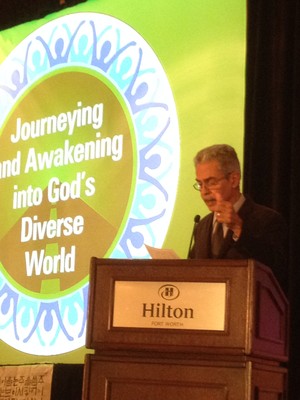Christians must understand the biblical story as “the story of immigrants” as they seek to respond faithfully to the immigration issues facing the United States and the world, a noted Latin American theologian told the 15th National Multicultural Church Conference of the Presbyterian Church (U.S.A.) here Aug. 1.
“The Israelites were illegal aliens in Egypt, strangers in the midst of a powerful empire,” said the Rev. Luis Rivera-Pagan, a Baptist native of Puerto Rico and emeritus professor at Princeton Theological Seminary, the University of Puerto Rico and the Evangelical Seminary of Puerto Rico. “This is the fate of many immigrants,” he said, “subject to scorn and fear intertwined because these empires are powerful yet fearful.”
That fear is expressed in many xenophobic terms, Rivera-Pagan said: “illegal alien,” “intruders,” “border breakers.” Governmental/political responses have ranged from denial of basic services to proposed amendments “that would deny the children of undocumented immigrants basic constitutional rights, leading some to call the U.S. ‘the deportation nation,’” he said.
But both the Old and New Testaments tell a far different story, Rivera-Pagan said. “The Israelites remembered when they were a scorned, immigrant people in Egypt. Hence, caring for the stranger became a key element of the Torah,” he said, citing the words of Deuteronomy: “Love the stranger because you were once strangers.”
Likewise, the prophets “chastised the powerful for their mistreatment or lack of treatment to widows, children and foreigners,” Rivera-Pagan said, instead embracing “the ethics of hospitality, loving the stranger.”
The United States is largely identified by its Anglo-Saxon viewpoints, Rivera-Pagan continued, to the point where those who first came from northern Europe are referred to as “settlers” rather than “immigrants.” As a result, he said, today’s immigrants — primarily Hispanics from Latin America — are considered “a threat to the cultural, linguistic and political integrity of the United States.”
What is required, Rivera-Pagan insisted, “is embracing greater cultural diversity and to enjoy and celebrate the dignity of difference. Do we really pose a threat to the cultural and political integrity of the United States? I guess it depends on the eye of the beholder.”
The first step we need to take, Rivera-Pagan said, “is to look at this issue from the perspective of the immigrants, right up to the real threat of death in the desert. We must look at the effects of global economic inequality that links everyone’s destiny together and produces the immigration we are seeing.”

